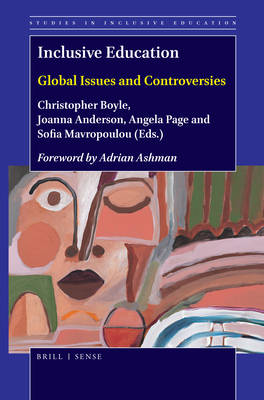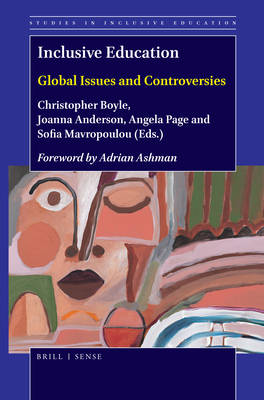
Je cadeautjes zeker op tijd in huis hebben voor de feestdagen? Kom langs in onze winkels en vind het perfecte geschenk!
- Afhalen na 1 uur in een winkel met voorraad
- Gratis thuislevering in België vanaf € 30
- Ruim aanbod met 7 miljoen producten
Je cadeautjes zeker op tijd in huis hebben voor de feestdagen? Kom langs in onze winkels en vind het perfecte geschenk!
- Afhalen na 1 uur in een winkel met voorraad
- Gratis thuislevering in België vanaf € 30
- Ruim aanbod met 7 miljoen producten
Zoeken
Inclusive Education: Global Issues and Controversies
€ 224,95
+ 449 punten
Omschrijving
This edited book considers the main issues and controversies within the current educational context of inclusive education, from an international perspective. Authorities in the field such as Norwich, Kauffman, and Boyle, amongst many other international scholars, provide an enticing insight into many of the issues and controversies around inclusive education, and whether it is achievable or not. We have reached a point in time where inclusive education has been the prevailing doctrine for universal education policies. However, there are still many challenges facing those working within the inclusive education space, with some countries actually becoming less inclusive.
International and national legislation has continued to move towards inclusive education, yet there seems to be many gaps between the philosophy and the principles of inclusive education and systemic practice.
The book aims to address the current debates surrounding the implementation of inclusive education, and also offers insights into the inconsistencies between policies and practices in inclusive environments. Moreover, it analyzes contemporary research evidence on the effectiveness of inclusion and identify directions for future research.
Contributors are: Kelly-Ann Allen, Dimitris Anastasiou, Joanna Anderson, Adrian Ashman, Jeanmarie Badar, Christopher Boyle, Jonathan M. Campbell, Heather Craig, Leire Darretxe, Julian Elliott, Zuriñe Gaintza, Betty A. Hallenbeck, Divya Jindal-Snape, Marguerite Jones, James M. Kauffman, George Koutsouris, Fraser Lauchlan, Gerry Mac Ruairc, Sofia Mavropoulou, Daniel Mays, Brahm Norwich, Angela Page, Kirsten S. Railey, and Federico R. Waitoller.
International and national legislation has continued to move towards inclusive education, yet there seems to be many gaps between the philosophy and the principles of inclusive education and systemic practice.
The book aims to address the current debates surrounding the implementation of inclusive education, and also offers insights into the inconsistencies between policies and practices in inclusive environments. Moreover, it analyzes contemporary research evidence on the effectiveness of inclusion and identify directions for future research.
Contributors are: Kelly-Ann Allen, Dimitris Anastasiou, Joanna Anderson, Adrian Ashman, Jeanmarie Badar, Christopher Boyle, Jonathan M. Campbell, Heather Craig, Leire Darretxe, Julian Elliott, Zuriñe Gaintza, Betty A. Hallenbeck, Divya Jindal-Snape, Marguerite Jones, James M. Kauffman, George Koutsouris, Fraser Lauchlan, Gerry Mac Ruairc, Sofia Mavropoulou, Daniel Mays, Brahm Norwich, Angela Page, Kirsten S. Railey, and Federico R. Waitoller.
Specificaties
Betrokkenen
- Uitgeverij:
Inhoud
- Aantal bladzijden:
- 282
- Taal:
- Engels
- Reeks:
- Reeksnummer:
- nr. 45
Eigenschappen
- Productcode (EAN):
- 9789004431164
- Verschijningsdatum:
- 26/06/2020
- Uitvoering:
- Hardcover
- Formaat:
- Genaaid
- Afmetingen:
- 157 mm x 236 mm
- Gewicht:
- 521 g

Alleen bij Standaard Boekhandel
+ 449 punten op je klantenkaart van Standaard Boekhandel
Beoordelingen
We publiceren alleen reviews die voldoen aan de voorwaarden voor reviews. Bekijk onze voorwaarden voor reviews.








